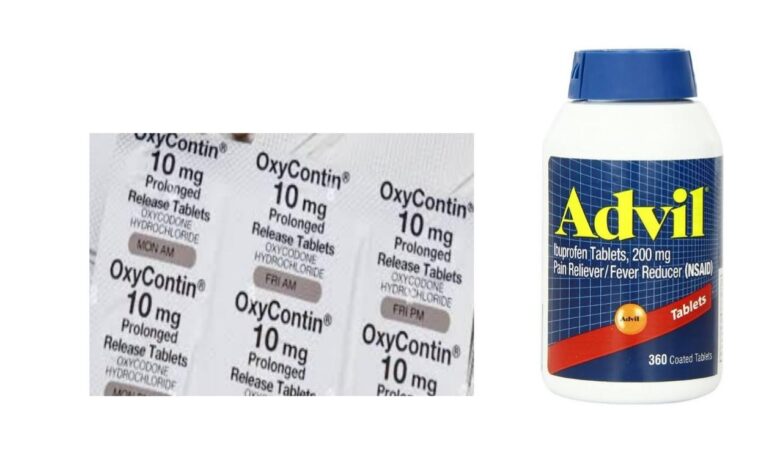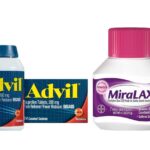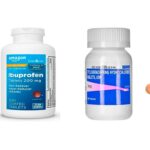Can You Take Oxycodone With Ibuprofen?

Generally, prescription and over-the-counter (OTC) medications are tested to make sure they’re safe and effective. But if you mix those drugs with other medicines or substances—intentionally or even by accident—they can have potentially dangerous effects.
A drug’s “active ingredient” is the part of the drug that acts on your body. Combining substances can change the way an active ingredient works. This can increase the effect of that ingredient on your body, make it less effective, or have other unexpected results.
What is Oxycodone?
Oxycodone is a semi-synthetic drug belonging to a class of medications called opiate (narcotic) analgesics. It works by changing the way the brain and nervous system respond to pain, can relieve moderate to severe acute pain. It is most useful for spontaneous bursts of shooting pain, also known as paroxysmal pain.
Doctors often prescribe oxycodone for:
- paroxysmal pain
- steady pain
- allodynia, or a clinically sensitive pain response
- chronic pain
- cancer-related pain
How to take oxycodone
Oxycodone is available in a number of forms, including:
• liquid
• concentrated solution
• tablet
• capsule
People take all forms of oxycodone orally, meaning by mouth. A doctor will advise a person what dose of oxycodone to take and how often.
It is essential to follow a doctor’s instructions carefully. They will determine the correct amount of oxycodone for an individual to take, and a person must not exceed this or take the drug more frequently than stated on their prescription.
It is best to carefully measure out liquid forms of oxycodone to avoid taking too much.
Depending on why they are taking it, a person can use oxycodone for short- or long-term pain relief. Again, it is important only to take oxycodone for as long as the doctor prescribes.
Some oxycodone capsules and tablets are extended-release, meaning they release the medication over a longer time than other types.
If a person feels nauseous, it may help to take oxycodone with food.
What is Ibuprofen?
Ibuprofen is a nonsteroidal anti-inflammatory drug (NSAID). It works by reducing hormones that cause inflammation and pain in the body. Ibuprofen is used to reduce fever and treat pain or inflammation caused by many conditions such as headache, toothache, back pain, arthritis, menstrual cramps, or minor injury. Ibuprofen is used in adults and children who are at least 6 months old.
Can You Take Oxycodone With Ibuprofen?
Do not take ibuprofen (Advil) with oxycodone together, unless your doctor asks you to do so. Combination products of oxycodone with ibuprofen used to be available for pain management, but due to safety concerns, they’re no longer available for use.
Nevertheless, in some cases, your doctor may prescribe ibuprofen and oxycodone separately to manage your pain. But don’t take non-opioid pain medications such as ibuprofen or other NSAIDs with oxycodone, unless your doctor recommends it. Doing so could lead to serious side effects.
Be sure to ask your doctor about your pain treatment plan and how to manage your pain. Follow your doctor’s directions on how to take oxycodone 5mg oral tablets, with or without other medications.
What side effects should I expect from mixing ibuprofen with oxycodone?
Along with its needed effects, taking ibuprofen with oxycodone may cause some unwanted effects. Although not all of these side effects may occur, if they do occur they may need medical attention.
Check with your doctor immediately if any of the following side effects occur:
Less common
- Feeling faint, dizzy, or lightheaded
- feeling of warmth or heat
- flushing or redness of the skin, especially on the face and neck
- headache
- sweating
Rare
- Abdominal or stomach pain
- blurred vision
- changes in skin color
- chest pain
- confusion
- convulsions
- decrease in frequency of urination
- decreased urine
- difficulty in passing urine (dribbling)
- difficulty with breathing
- dizziness
- dizziness, faintness, or lightheadedness when getting up from a lying position
- dry mouth
- excessive muscle tone
- fainting
- fast, pounding, or irregular heartbeat or pulse
- increased need to urinate
- increased thirst
- loss of appetite
- mood changes
- muscle pain or cramps
- muscle stiffness
- muscle tension or tightness
- nausea or vomiting
- numbness or tingling in the hands, feet, or lips
- pain, tenderness, or swelling of the foot or leg
- painful urination
- pale skin
- passing urine more often
- severe constipation
- severe vomiting
- troubled breathing with exertion
- unusual bleeding or bruising
- unusual tiredness or weakness
Get emergency help immediately if any of the following symptoms of overdose occur:
Symptoms of overdose
- Change in consciousness
- chest pain or discomfort
- cold and clammy skin
- constricted pupils
- continuing ringing or buzzing or other unexplained noise in the ears
- decreased awareness or responsiveness
- difficult or troubled breathing
- difficulty with sleeping
- disorientation
- drowsiness to profound coma
- fainting
- hearing loss
- irregular, fast or slow, or shallow breathing
- lethargy
- loss of bladder control
- loss of consciousness
- muscle spasm or jerking of all extremities
- pale or blue lips, fingernails, or skin
- seeing, hearing, or feeling things that are not there
- severe sleepiness
- skeletal muscle flaccidity
- sleepiness or unusual drowsiness
- sudden fainting
- sudden loss of consciousness
Some side effects may occur that usually do not need medical attention. These side effects may go away during treatment as your body adjusts to the medicine. Also, your health care professional may be able to tell you about ways to prevent or reduce some of these side effects. Check with your health care professional if any of the following side effects continue or are bothersome or if you have any questions about them.





